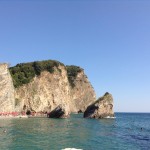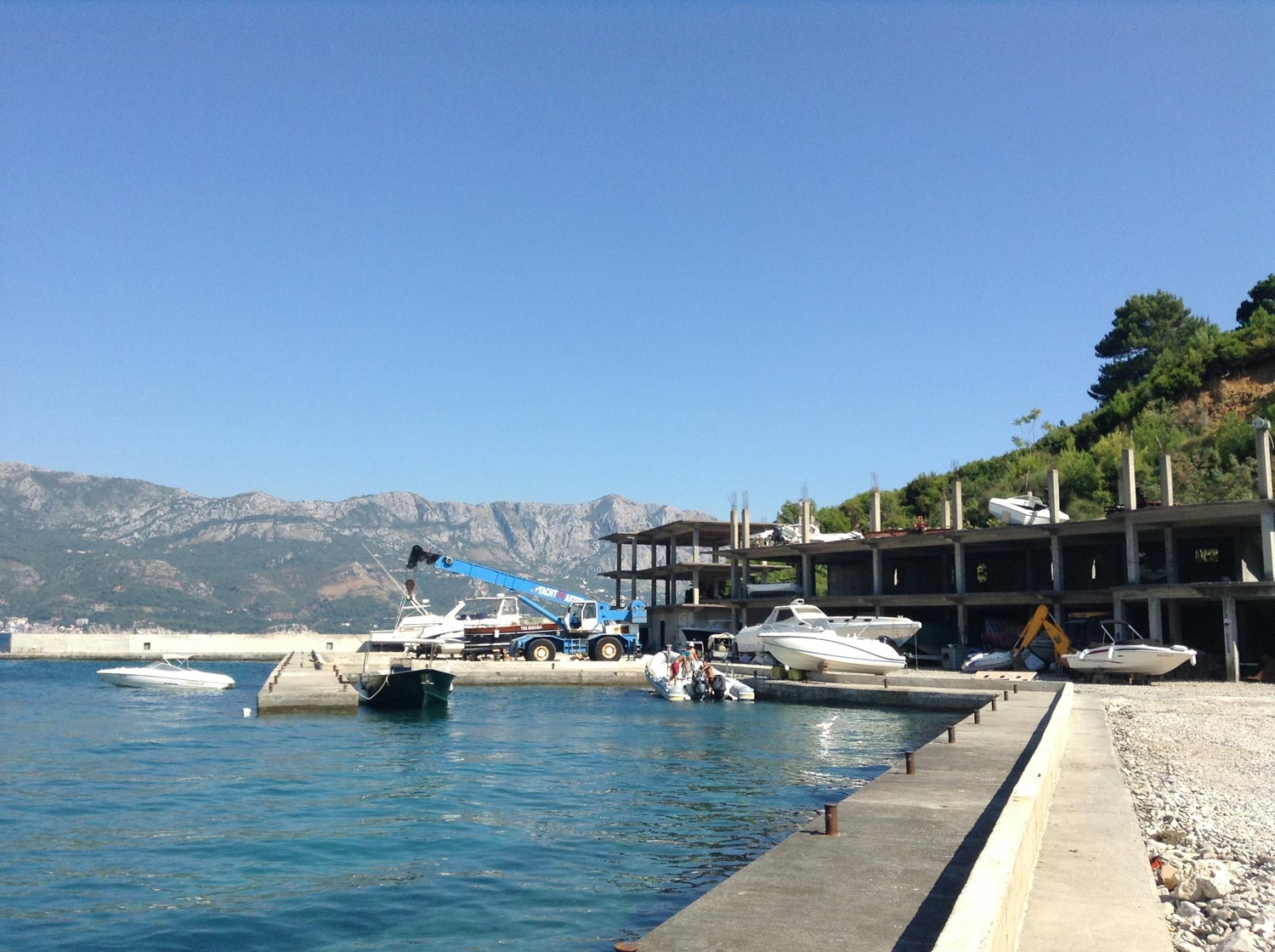Early in the evening of April 15, 2012, the port of Bari on the Adriatic coast of Italy received a radio distress call from two Italian men who said they had just had a collision with something at sea.
When they were found two hours later, they were afloat in a life raft. They told rescuers they had embarked that morning on a fishing trip in their boat, the Jeanneau, from the southern Italian port of Brindisi, but had to abandon ship.
Two weeks later, Croatian maritime police found the Jeanneau, an 8-meter blue-and-white motorboat, drifting more than 500 kilometers north of Bari on the other side of the Adriatic. It was near the small island of St. Andrew off the northern Croatian peninsula of Istria. They found no fishing poles or nets aboard the Jeanneau.
They did find almost 1,600 cartons of FM and LM brand cigarettes weighing almost 320 kg.
Italian police became suspicious and checked the call logs from the men’s mobile phones. The men had not been honest with police. The call logs showed they had been in Montenegro and not Brindisi before the accident.
This discovery triggered an 16-month-long investigation that in September 2013 resulted in the arrest and detention of 42 people for cigarette smuggling.
The police found the cigarettes were coming across the Adriatic from Montenegro, smuggled in motorboats run by organized crime. It appeared as if history was repeating itself.
Back in the late 1990s, cigarette smuggling was a state business in Montenegro. Every night dozens of large speedboats crammed with cigarettes were making the two-hour crossing. Two Italian organized crime syndicates, the Neapolitan Camorra and the Sacra Corona Unita (United Sacred Crown, from the Apulia region in Italy’s southeast), operated the business, while Montenegrin state businesses provided the cigarettes.
Montenegrin Prime Minister Milo Djukanovic would later acknowledge the operation, saying it was necessary to earn badly needed funds during a time of economic embargoes. Under pressure, the government later halted the illegal business in the late 1990s.
Smuggling appeared again after the state sanctioned smuggling ended, this time through duty free shops on the country’s border with Bosnia and Herzegovina. Those too were shut down quietly in 2008.
But now Montenegro has once again been identified as a cigarette-smuggling country.
No one knows how long the smuggling revival has been going on, and the new operation is definitely scaled down from the glory days -- but some of the smugglers are veterans of that previous crime era and other names involved are familiar as well.
St. Nikola Island as a Base
According to Guardia di Finanza, the Italian finance police, the tiny beach island of St. Nikola across from the tourist hub of Budva served as a logistical base and “home” during the smuggling operations in at least 2012 and 2013 and possibly longer. The smugglers who transported the cigarettes to the Italian coast of Apulia would remain on the island during their stay in Montenegro.
The island was owned from 2007 to 2010 by companies owned by Serbian businessman Stanko Subotic. Subotic is a name popularly connected to Montenegrin cigarette smuggling in the media. He, along with his friend (and Montenegro’s Prime Minister) Milo Djukanovic, were indicted for smuggling cigarettes to Italy through Italian organized crime groups. Djukanovic avoided prosecution due to immunity as head of state, while charges against Subotic were dropped in 2013. However, Subotic still faces cigarette smuggling-related charges by Serbia.
Subotic once planned an opulent resort and marina for St. Nikola but instead his companies defaulted on loans provided by First Bank, which was owned by Djukanovic’s family.
The island is privately owned and its previous owners, including Subotic, kept a tight lid on who was allowed to visit. From Budva, a kilometer away across the water, it was hard to see what was going on.
Although it is largely uninhabited, it was not totally deserted. A Montenegrin company, Yachtmaster, operates a boat repair service there. A previous owner left behind a partially constructed hotel with an underground basement.
Italian police say that the area in the harbor around the business and the hotel area were used for smuggling based on tracking data they collected from the boats. It is not clear how long it had gone on but the prosecutors think it may have been for years.
Yachtmaster was registered as a company in March 2007, the same month Subotic bought the island. Yachtmaster’s owner is Zeljko Perovic, a Budva marine mechanic. According to Italian investigators, a man named Zeljko was the vital Montenegrin link in the smuggling operation and evidence suggests they are the same man. Calls that police tapped from cigarette smugglers often went to Zeljko Perovic’s mobile phone number and his name showed up in the wallet of one of the arrested men.
OCCRP reporters called the number from the Italian arrest warrant and Perovic answered but would not comment.
Unlike Italian police, Montenegrin police have made no arrests or charges and there is no evidence that they are investigating. Italian police did not cooperate with Montenegrin police during the recent operation.
The island later changed hands after Subotic’s companies defaulted on loans to First Bank. Ownership changed to a British Virgin Islands company and then a Panamanian company. Both are secretive jurisdictions which allow businesses to conceal the real identity of their owners.
However, one man may know who owns the island at present: Montenegro’s Minister of Agriculture, Petar Ivanovic.
The current owners instructed a Panamanian company to mail important company documents to Ivanovic’s home address in Montenegro. OCCRP has also uncovered links between arrested drug lord Darko Saric and a trusted employee of Ivanovic who serves as a director for a company owned by Saric.
Ivanovic is also close to the prime minister and was recently appointed by Djukanovic’s government to a foreign investment body chaired by Djukanovic himself. In 2009, Saric helped Subotic by guaranteeing his loans at the First Bank. Saric also deposited large amounts of money in low-interest loans to First Bank that helped the bank at a critical time when it could not give customers their money.
Trip to Paradise
An OCCRP reporter visited the island in August 2013. The boat repair shop was operating with several vessels present; the entrance to the compound was blocked by a net obscuring any view inside.
Another part of the island featured a beachfront bar, several cafés and a restaurant. An OCCRP reporter asked staff in the bar how she could open a café on the island. They gave her the cell phone number of Djukanovic’s head of security.
A month later, arrests broke up the smuggling operation.
In September of last year, the head of security was also sighted with Stanko Subotic at the Leonardo Restaurant in Podgorica by Vanja Calovic the director of MANS, a local NGO, who published their photo in local newspapers.
According to evidence collected by police in Italy, the smuggling operation was undisturbed by Montenegrin authorities and at least one policeman who visited the island had been bribed.
The operation is the latest to show the deep connections between business, organized crime and government in this tiny nation. The various scandals have led some to call Montenegro a crime state masquerading as a real country.
Smuggling Operation
Guardia di Finanza, the Italian financial police, arrested several members of the group smuggling cigarettes from Montenegro on May 18, 2013. Video: Guardia di Finanza.

A 200-page long Italian court document details how the smugglers operated. The information is based on GPS trackers and listening devices police surreptitiously attached to boats, wiretapped calls and direct surveillance by Italian police.
Italian police intercepted a number of conversations among members of the group, often related to arranging details of smuggling operations – much of it mundane.
For example, a conversation in December of 2012, beginning just after noon, showed smugglers aboard ship discussing how to maximize the cigarette load. One suspect insists there’s enough room for 100 cases: “There is space here Mario … one hundred must go!” Well, but we need to be able to drive the boat, he is told. “It is essential that the boat goes well.”
They even tried to cram cartons inside the walls of the vessel. “Now we have to try to load all of the inside” to survive the trip to Brindisi. “We put them here, slowly make a bed,” said one man. “Tonight we will try and see how it goes,” responded another.
The GPS allowed police to track their movements in Italian and also Montenegrin territorial waters.
For example, on the same date at 5:27 p.m., the boat left the dock in front of St. Nikola’s half-built hotel and headed north. At 7:39 p.m., it arrived at a makeshift dock in the Bay of Traste on the Montenegrin side, located near a stone quarry and accessible only by a closed road. The site then and now is part of the Lustica Bay Project, a joint initiative between Orascom Development Holding, a major Egyptian development group, and the government of Montenegro. The dock is to be replaced by a luxury marina.
Smugglers stayed there for nearly 90 minutes, loading more boxes of cigarettes. At 8:03 p.m. they headed back to St. Nikola, where they waited for better weather before crossing to Italy.
According to police records, vessels travelled regularly between Montenegro and Puglia. Often more than one boat made the trip. From time to time, the police would intercept the boats and make arrests. For example, in late January, 2013, police caught two vessels filled with cigarettes as they approached the coast. On one vessel police discovered 139 kilos of illegal cigarettes and on another 150 kilos. However, they could not track all the vessels.
Montenegro Connection
In May 2013, police planted a GPS tracker and listening device on one of the boats in the St. Nikola marina. They listened to suspects trying to solve problems with radio communication so they could safely return to Italy.
According to intercepted communications, Zeljko, the boat repair shop owner, was helping with navigation. He informed those on board that the navigation equipment was provided by Antonio Prudentino.
Prudentino, according to police, was a family name familiar from the 1990s smuggling days. Francesco Prudentino, Antonio’s father was named in the Bari smuggling indictment along with Subotic and Djukanovic. According to the Bari indictment, Prudentino Sr. lived in Budva for a long time and it claims he was connected to the Camorro crime family. According to Italian police, Zeljko was one of Antonio’s most trusted men. Prudentino was later convicted of murder and mafia connections to the Sacra Corona Libera crime group.
The Bari indictment has a statement from a mafia informant where he said Prudentino Sr. set up a meeting with Milo Djukanovic, according to the testimony, to solve an immigration problem for a mafia affiliate. The indictment also said Prudentio was close to Montenegrin gangster Brano Micunovic.
In May 2013, police intercepted phone calls by Prudentino Jr. who turned to Zeljko for help in selling a vessel that was in Montenegro. At the time, police has already made a number of seizures so they believed smugglers were trying to get rid of boats which had been modified with increased storage for smuggling.
Intercepts show that Prudentino Jr. contacted Zeljko on May 22 using a public phone in Ostuni, Italy. He first asked Zeljko if the illegal operation was still ongoing and Zeljko confirmed it was.
Then he asked if a bill for work on the boat had been settled. Zeljko responded: “Yes, paid for everything … no problem.”
Zeljko performed a vital role in Montenegro for the group by rounding up cigarettes and at time when the Italians were concerned they couldn’t meet the pressing demand for tobacco.
Police say Italian smugglers were selling the cases wholesale to other mafia groups for about €600 (US$828) per case (500 to 550 packs). Each case could be sold for up to €8,000 (US$11,000) on the street. Each shipment cost the Italian government as much as €65,000 (US$90,000) in taxes.
Not only did Zeljko help with supply, he also advised smugglers. At one point they feared the Guardia di Finanza was on their trail. They consulted Zeljko. On Feb. 16, 2013, intercepts show that one of the smugglers sent an SMS saying that his friend Zeljko had advised him to store the tobacco in a safe place, and wait until the heat was off.
No Reason to Fear Police
In a conversation taped on May 19, 2013, Montenegrin police were doing a general check on the island which significantly curtailed the smugglers’ activities. According to a transcript, one smuggler complained, “One can’t do anything ... can’t drink or do anything.”
At the time, a boat was already fully loaded with cigarettes and just needed a supply of gasoline to be on its way. Because of the police the group decided to only bring a small number of canisters at a time, to avoid notice.
Three days later, Italian police captured a conversation about an alleged bribery episode involving a Montenegrin police officer on the island. The officer was the beneficiary of substantial free work on his boat. He also received “gifts” – gasoline cans in exchange for looking the other way.
Lorenzo Bodrero (IRPI) and Dejan Milovac (MANS) contributed to this story.







